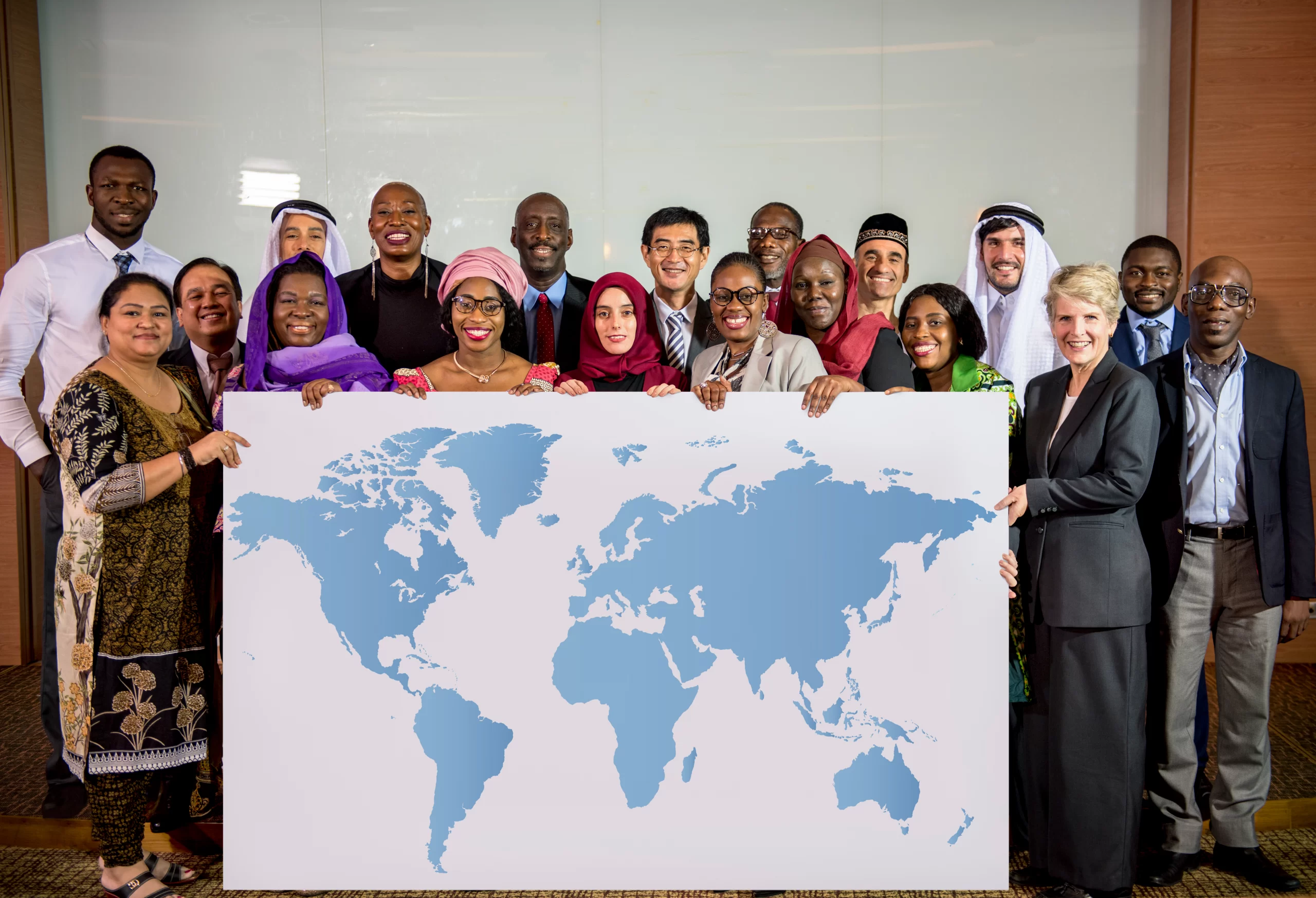In this “UN Special” series, we explore the actions and achievements of the various organizations of the United Nations. Throughout the series, readers will have the opportunity to learn how these agencies work collaboratively, tackling global challenges and promoting peace, social justice and environmental sustainability. From promoting gender equality to preserving the environment, from finding clean energy sources to spreading global education, the series showcases the crucial roles played by these bodies in building a more prosperous and equitable future for all nations and communities.
The General Assembly of the United Nations – AGNU – represents the main policy-making body of this global institution. Bringing together all Member States, this important forum provides for multilateral discussions on a wide range of international issues addressed by the Charter of the United Nations. Each of the 193 Member States has an equal vote, making it a democratic and inclusive platform.
In the context of the UN, the UNGA has an indisputable relevance, since it is responsible for making crucial decisions for the functioning of the organization. Among its attributions, we highlight the appointment of the Secretary-General, upon recommendation of the Security Council, the election of non-permanent members of the Security Council and the approval of the UN budget.
Regular sessions of the General Assembly take place annually from September to December, but may be convened at other times as required. During these sessions, specific topics are addressed through previously defined items or sub-items on the agenda, culminating in the adoption of resolutions.
It is important to note that the distribution of seats in the General Assembly Hall is changed at each session. Within the framework of the 77th Session (2022-2023), Belize has the privilege of occupying the first chair, followed by the other countries in alphabetical order in English.
Since the beginning of the COVID-19 pandemic in 2020, the AGNU has taken new measures to ensure the continuity of its activities and, at the same time, contain the spread of the disease. To this end, it has used virtual platforms to hold meetings and implemented electronic voting as a decision-making procedure in cases where face-to-face meetings are not feasible.
However, the pandemic is not the only challenge facing the world. Issues such as racism, intolerance, inequality, climate change, poverty, hunger and armed conflict remain global problems to be faced. In this context, the General Assembly is a critical opportunity for the international community to come together, seek joint solutions and chart a course towards a more promising future.
Therefore, the UNGA maintains its relevance as a privileged space for dialogue and cooperation among nations, seeking to collectively face the challenges that affect humanity as a whole. By promoting global action, the General Assembly reaffirms its commitment to building a more peaceful and sustainable world for present and future generations.
As an example of the formulation of global policies, the United Nations Conference on Climate Change 2023 (UNFCCC COP 28) emerges as an event of extreme relevance in the international scenario, since it brings together leaders and representatives of countries from all over the world with the objective to address and seek solutions to the growing climate crisis.
UNFCCC COP 28 represents the 28th edition of this conference, which has been held annually since 1995. During the event, participants discuss measures to combat climate change, improve mitigation and adaptation actions, in addition to reviewing the commitments assumed by countries under the Agreement from Paris.
The Paris Agreement, adopted in 2015 during COP 21, is a historic milestone in international cooperation to tackle climate change. Its main objective is to limit the global temperature increase below 2°C above pre-industrial levels, with efforts to limit it to 1.5°C. To achieve this ambitious goal, signatory countries must submit Nationally Determined Contributions (NDCs), which are their individual commitments to reduce greenhouse gas emissions.
COP 28 will therefore be a crucial opportunity to assess the progress made so far and define further strategies to scale up climate action. The conference will also address the specific challenges faced by developing countries and communities most vulnerable to the consequences of climate change.
Furthermore, UNFCCC COP 28 intends to emphasize the importance of international cooperation, technology transfer and adequate financing to support developing countries in implementing adaptation and mitigation measures.
A central point of COP 28 will be the search for innovative and practical solutions that involve all sectors of society, including governments, the private sector, non-governmental organizations and citizens.
As such, COP 28 represents an opportunity for world leaders to demonstrate their commitment to climate action and accelerate the implementation of concrete measures. The world is closely watching the decisions taken during this conference, as the fight against climate change is an urgent and crucial issue for the survival of the planet and its diverse forms of life.
The UAE COP28: Ambitious Agenda Charting a Sustainable Future
COP28 UAE (28th Conference of the Parties to the United Nations Framework Convention on Climate Change) brings together leaders and representatives from around the world at a critical time for transformative global climate action. With the ever-increasing urgency of tackling the climate crisis and its consequences, this conference presents itself as a crucial opportunity to chart a path towards a sustainable and resilient future for the planet.
The fundamental pillar of COP28 UAE is the search for the implementation of an ambitious and concrete agenda. The urgency of containing global warming and limiting the increase in global average temperature to 1.5°C compared to pre-industrial levels requires bold and committed measures. Discussions and decisions at this conference must go beyond rhetoric and aspirations, prioritizing concrete and effective actions to reduce greenhouse gas emissions and face the impacts of climate change.
Inclusion is a core value in this edition of the COP. Recognizing that the climate crisis disproportionately affects vulnerable and marginalized communities, the conference strives to ensure that all voices are heard and considered in the decision-making process. The diversity of perspectives and experiences is fundamental for building comprehensive and fair solutions, capable of facing climate challenges with equity.
The COP28 thematic program reflects stakeholder contributions and concerns during the consultation process. It emphasizes the importance of addressing the sectors and topics that need to be on the COP agenda each year, while also addressing crucial new topics such as health, trade and assistance, recovery and peace. This scope demonstrates COP28's commitment to addressing climate challenges from different perspectives and approaches.
Thematic day programming incorporates four cross-cutting themes that are essential for effective and interconnected delivery of climate solutions. The first one is "Technology and inovation", emphasizing the importance of exploring and implementing technological advances to reduce emissions and promote sustainability. The search for innovative solutions is fundamental to face the complex challenges of the climate crisis.
The second cross-cutting theme is "Inclusion", recognizing the need to involve all stakeholders and ensure representation of diverse perspectives. An inclusive approach is key to building solid and sustainable agreements that reflect the needs and realities of all communities affected by climate change.
The third cross-cutting theme is “Frontline Communities”, highlighting the role of the most vulnerable communities directly affected by climate change. It is essential to ensure that their voices are heard and that they receive the support they need to address the impacts of global warming.
The fourth and final cross-cutting theme is “Finance”, recognizing that adequate financing is crucial for the effective implementation of climate action. Mobilizing adequate financial resources is essential to enable developing countries to deal with climate challenges and promote the transition to a low-carbon economy.
COP28 emerges as a crucial opportunity to seek practical and concrete solutions that drive transformative actions in relation to climate change.
Renewable Energies and Sustainable Technologies as Solutions to the Climate Crisis
In the midst of the urgency of the global climate crisis, renewable energies are emerging as key players in the search for alternatives to reduce the effects of rising temperatures. Sources such as solar and wind energy have emerged as essential tools to mitigate greenhouse gas emissions and promote environmental sustainability.
In recent years, humanity has been heavily dependent on fossil fuels such as coal and oil, the burning of which results in high levels of greenhouse gas emissions into the atmosphere. In this context, the transition to renewable energies becomes not only desirable, but necessary to combat global warming and its devastating impacts.
One of the key sectors that has gained prominence in the fight against climate change is electric mobility. Electric vehicles represent a significant opportunity to reduce global transport-related emissions and thereby contribute to global greenhouse gas reduction targets. The currently available electrification technologies have the potential to completely eliminate these emissions by 2050, making it a viable and efficient option to decarbonize the vehicle fleet.
The concept of Smart Cities also emerges as an innovative approach to face climate challenges. Using information and communication technologies, smart cities seek to optimize services and infrastructure, improve resource management and, consequently, make cities more sustainable and conducive to the quality of life of their inhabitants. The digitization of services such as electricity supply, traffic monitoring and public safety, in addition to the automation of energy distribution lines, are some examples of how technology can be applied to make cities more efficient and environmentally friendly.
The adoption of biofertilizers to replace conventional fertilizers also represents a crucial strategy to reduce negative impacts on the environment in agriculture. These biofertilizers favor the multiplication of beneficial microorganisms in the soil, improving its health and fertility. In addition, its use contributes to replenishing essential minerals in the soil, making it more porous and allowing greater penetration of air to the roots of plants.
The ESG (Environmental, Social and Governance) concept has gained increasing relevance in the corporate scenario, driving companies to prioritize actions that minimize impacts on the environment, promote social responsibility and implement more efficient governance practices. Investors and companies are increasingly committing themselves to actions aimed at improving people's quality of life and promoting more sustainable management processes.
Another promising innovation is the floating solar plant, which takes advantage of the surface of water such as lakes in hydroelectric plants for the installation of photovoltaic modules. In addition to expanding the site's electrical capacity, the water cools the system, increasing the plant's energy efficiency. This technology prevents the proliferation of algae, frees up land space for other sustainable actions and reduces water evaporation, lowering its temperature.
Finally, implementing smart monitoring is a vital strategy to prevent disasters caused by extreme weather events. The use of advanced technologies to monitor slopes, for example, can preserve roads, large works and nearby communities, preventing tragedies and saving lives.
In summary, investment in sustainable technologies and the adoption of renewable energies represent crucial steps to tackle climate change. COP 28 and other global forums have the responsibility to encourage the development and application of these solutions, seeking to transform climate action into an effective reality.
The Need for Social Inclusion to Mitigate the Impacts of Climate Change
The IPCC Working Group II report, responsible for addressing impacts, vulnerabilities and adaptations to climate change, emphatically highlights the urgent need for social transformation to face the climate emergency. In addition, the report points to the importance of including other forms of knowledge, such as that of indigenous and traditional local peoples, along with scientific knowledge, for mitigating the effects of climate change.
By analyzing the impacts resulting from climate change, the report emphasizes that a radical change in the way of life and in the organization of society is essential to face the climate crisis. This means rethinking consumption patterns, production systems and the use of natural resources, seeking more sustainable and resilient alternatives.
One of the fundamental contributions highlighted in the report is indigenous knowledge, which proves to be crucial for the preparation of plans to adapt to climate change. Indigenous peoples and traditional communities have always been impacted by environmental change, but the report now recognizes that they can play an active role in finding solutions.
Valuing indigenous knowledge in tackling climate change is a highlight and at the same time a challenge. Scientists recognize the importance of including other perspectives and knowledge, but still seek effective ways of integration. This requires an inclusive approach, bringing indigenous authors closer to the debate and opening space for dialogue between the social sciences and earth sciences.
In the chapter on poverty and inequality, the report emphasizes the need to integrate science with traditional peoples. The summary for decision makers values not only scientific knowledge, but also indigenous and traditional local knowledge, with the aim of increasing understanding, awareness and assessment of the climate emergency. The intention is to influence behaviors that can reduce the risks of climate change on the planet.
In addition, the report highlights the vulnerability of indigenous peoples and traditional communities, who are directly dependent on ecosystems for their survival. The loss of these ecosystems affects everyone, but it especially impacts these populations, who have a deep connection with nature and its resources.
Given this scenario, it is essential to recognize the importance of social inclusion to mitigate the impacts of climate change. Cooperation between scientific and indigenous knowledge, combined with an inclusive and collaborative approach, can open the way for the implementation of more comprehensive and effective solutions.
UN reaffirms the Right to Peace as a Priority for 2023
In a presentation before the General Assembly, the UN reiterated the urgency of prioritizing the right to peace in the midst of a scenario of unprecedented challenges that are designed for the year 2023. Other crucial areas that demand attention were also listed, including the right to development, preservation of the environment, respect for diversity and cultural rights, full gender equality, as well as civil and political rights.
The growing convergence of challenges was highlighted, presenting the conflict in Ukraine, the climate crisis, extreme poverty and the recent earthquakes in Türkiye and Syria as representative examples of this worrying reality.
Unfortunately, the prospects for peace are growing dimmer and the risks of an escalation of conflict and violence continue to increase.
However, the right to peace can be guaranteed if all countries fulfill their obligations stipulated in the Charter of the United Nations. In this context, the UN called for a collective effort to combat climate change, denouncing the lack of a “strategic vision” and the “short-term bias” on the part of political and economic leaders.
In this sense, he defended a radical transformation in the global financial architecture, seeking to break with the economic system that perpetuates poverty and hunger, accentuates inequality between rich and poor and overloads developing countries with unsustainable debts.
The UN appeal also focused on the pressing need for a “renewable energy revolution” as a response to the “self-destructive resurgence of fossil fuels”.
At the same time, he lamented setbacks in access to women's rights, reinforcing the importance of moving towards full gender equality as a central element in achieving a fairer and more equitable society.
At United Nations (UN) Headquarters in New York, Secretary-General António Guterres addressed crucial issues related to the devastating economic impact of war during his address to the General Assembly. In an emphatic plea, Guterres called for urgent international cooperation to address the challenges generated by armed conflicts around the world.
By highlighting the magnitude of economic damage caused by warlike conflicts, the UN leader stressed that war not only destroys lives and infrastructure, but also generates far-reaching side effects on the global economy. Increased military expenditure, losses in production and trade, as well as human and social costs, are some of the worrying dimensions that Guterres addressed in his speech.
In this context, the Secretary General emphasized the urgent need for greater cooperation among nations to prevent and resolve conflicts, stressing that war is invariably a failure of diplomacy. Through a diplomatic and dialogue-based approach, the international community must work tirelessly to prevent conflict and find peaceful solutions to disputes, thereby avoiding the crushing weight of the economic and human impact of war.
Guterres recalled the challenges faced by countries in conflict, where the destruction resulting from fighting can have long-term socioeconomic consequences, hindering the development and well-being of affected populations. In addition, he highlighted concerns about the waves of refugees and internally displaced people that often follow conflicts, aggravating regional tensions and generating significant humanitarian demands.
The Secretary-General urged political leaders and international authorities to redouble their efforts towards peace and global cooperation, moving away from unilateral and confrontational approaches. It is essential to promote preventive diplomacy, mediate disputes and support negotiated solutions that consider the diversity of interests and perspectives.
In this way, Guterres emphasized that international cooperation is not limited only to the resolution of existing conflicts, but also to the prevention of new crises. Concrete actions and investments in diplomacy and building relationships based on trust are essential to ensure security and sustainable progress for future generations.
The UN General Assembly becomes a crucial stage for discussions and actions aimed at cooperation and the search for peaceful solutions to global problems. In the face of growing threats to peace and economic stability, the international community is called upon to join forces, overcome divisions and work towards a more peaceful, secure and prosperous world for all.
Change Finance, Finance Change: The Crucial Role of Climate Finance
Climate finance is a key part of the fight against climate change. Refers to local, national or transnational financial support from various sources, whether public, private or alternative. In order to effectively face the challenges posed by climate change, financing becomes a key factor, as large-scale investments are needed to significantly reduce greenhouse gas emissions, especially in sectors that contribute substantially to these emissions.
Furthermore, climate finance plays a crucial role in adaptation, as substantial financial resources will be needed to enable societies and economies to adjust to the adverse effects of climate change and reduce its impacts.
The United Nations Environment Program (UNEP) plays an important role in climate finance through its Finance Initiative. This aims to support private sector financial institutions, such as banks, brokerages and insurance companies, to understand and mitigate climate risks, identify business opportunities arising from climate action and, finally, take all necessary measures to align their investments with mitigation objectives. and adaptation established by the Paris Agreement.
The Finance Initiative published a report highlighting a number of key recommendations for accelerating adaptation finance from the private sector. The aim is to catalyze systemic changes in the financial sector, thereby providing important evidence to support concrete action during the Global Commission on Adaptation's Year of Action 2019-20.
Projects related to financing with governments are also essential in supporting developing countries to access climate finance resources, either directly or through accredited entities. Funds such as the Green Climate Fund (GCF), the Global Environment Facility (GEF) and the Adaptation Fund (AF) stand out as important sources for such initiatives, in addition to other bilateral or multilateral public sources.
Climate finance therefore represents a vital tool to drive concrete and collaborative actions towards a sustainable and resilient future in the face of the challenges posed by climate change.




